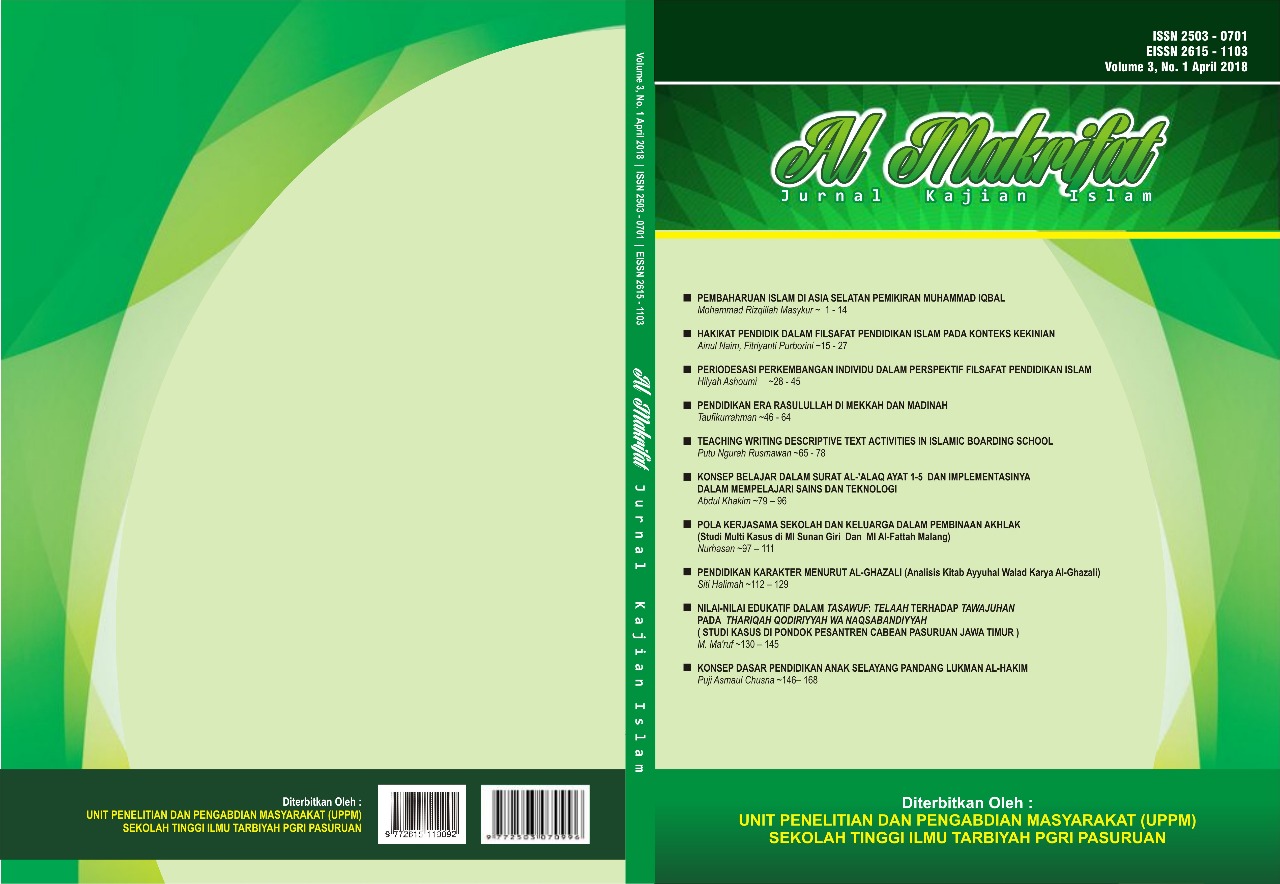Pola Kerjasama Sekolah dan Keluarga dalam Pembinaan Akhlak (Studi Multi Kasus di MI Sunan Giri Dan MI Al-Fattah Malang)
Abstract
Education in the family is needed to create the next generation that has a good moral foundation. No child can grow well when he does not get knowledge of good morals in the family. A child needs to acquire knowledge through the interaction of religious morality with family members. And also education not only from formal institutions such as schools, but also the smallest of the family institution. Karenananya the smallest sphere moral education is needed to create the character of a virtuous and noble ethical. Education in the family is the first and education, especially for children. Family education aims to make children able to develop optimally covering all aspects of child development , the physical and the spiritual, the family education will be found a very strong character in the person of a child's Education in the family can have a major impact on the character of a child. The researchers did a study including qualitative descriptive study. In the praises of data collection methods researchers use observation, interviews, and documentation, selamjutnya for data analysis, researchers used a qualitative descriptive analysis techniques using triangulation methods in data checking. The researchers did a study including qualitative descriptive study. In the praises of data collection method sresearch ersuse observation, interviews, and documentation, next for data analysis, researchers used qualitative descriptive analysis techniques using triangulation method. From the results of research conducted by the researchers explain that the shape patterns of cooperation between schools and families in the development of morality is to 1 ) establish the community of parents, 2 ) form a school committee, 3 ) make PHBI activities ( warning big day Islam ) , 4 ) conduct home visit conducted by the school against the students , all co-operation to achieve the vision and mission of the lembagabya , with the following measures : 1 ) conduct liaison book , 2 ) the beginning of the meeting conducted by the school and the parents , 3 ) the existence of a regular meeting conducted by community walimurid . Factors that affect the running parsed pattern of cooperation factor is parents and schools , while the parents of a factor is the lack of supervision of parents towards their children when they are diruah or outside of school hours .References
Mansur. 2005. Pendidikan Anak Usia Dini Dalam Islam. Pustaka Pelajar
Ainain, Ali Khalil Abu. 1985. Falsafah al-Tarbiyah fi al-Quran al-Karim. T.tp.: Dar al-Fikr al-‘Arabiy.
Al-Ghazali, Imam. 1995. Teosofia Al-Qur’an. Terj. oleh M. Luqman Hakiem dan Hosen Arjaz Jamad. Surabaya: Risalah Gusti.
Effective Publik Relations Edisi Kesembilan. Jakarta: Kencana. Mulyasa. 2003.
Heni Marlinawati (UMS, 2001), dalam penelitiannya yang berjudul "Konsep Pendidikan keluarga (studi atas pemikiran Hasan Langgulung)"
Kindred, Lislie W. 1957. School Public Relation. New Jersey: Practice Hall. M. Cutlip, Allen H. Center dan Glen M. Broom. 2006.
Lexy J, Moleong, Metodologi Penelitian Kualitatif (Bandung: Remaja Rosda Karya, 2001),
Nasution, Metode Research (Bandung: Jemmars, 1991)
Sismanto. 2007. Mendidik Akhlak Anak. Artikel. www.ketikagurumenulis.blogspot.com
Tatapangarsa Humaidi, “Pengantar Kuliah Akhlakâ€. PT Bina Ilmu, Surabaya,1984
Tim Dosen Agama Islam, “Pendidikan Agama Islam Untuk Mahasiswaâ€. IKIPMalang, Malang, 1995
Tirtarahardja, Umar dan S.L. La Sulo. 2005. Pengantar Pendidikan. Jakarta: Rineka Cipta
Wahini, Weda. 2002. Keluarga Sebagai Tempat Pertama Dan Utama Terjadinya Sosialisasi Pada Anak. Makalah Falsafah Sains IPB. Bogor
Wahyuningsih, Retno. 2007. Pengaruh Keluarga Terhadap Kenakalan Anak. Makalah Pendidikan Sosiologi UNY. Yogyakarta




